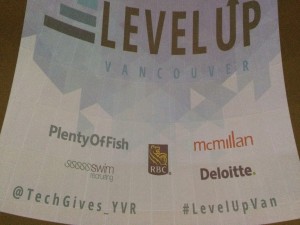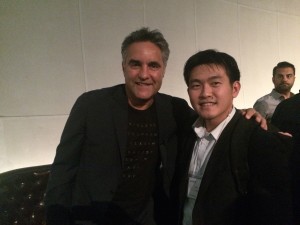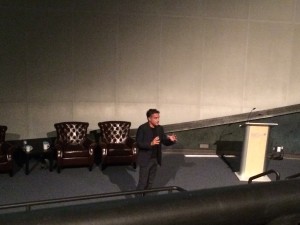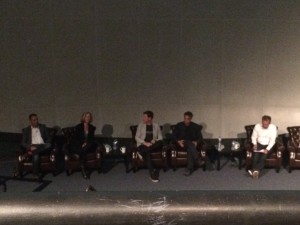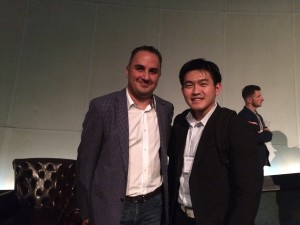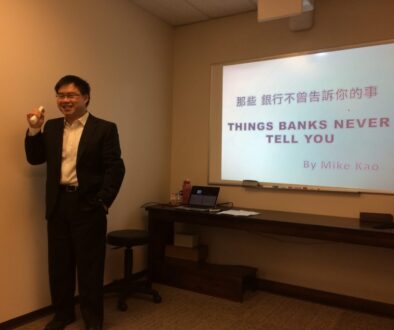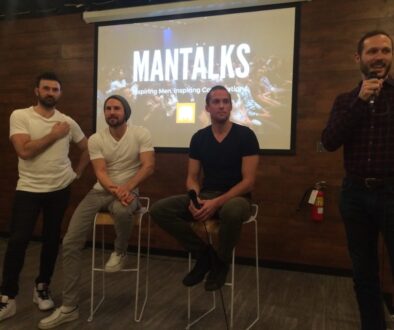Levelup Vancouver
Date: September 30, 2015
Name: Levelup Vancouver
Presenters: Bruce Croxon, Arash Fasihi, Laurie Schultz, and Roger Hardy
Vancouver startups are creating an exponential impact to British Columbia’s economic, especially the technology sector. Moreover, entrepreneurs need to be aware the new movement. PlentyOfFish and RBC present this presentation to explore the upcoming changes in technology from many world class companies. This presentation invites Bruce Croxon, the Co-Founder of Lavalife and the ex Dragon on CBC’s Dragon’s Den, Arash Fasihi, the Founder of Cymax, Laurie Schultz, the CEO of ACL, and Roger Hardy, the CEO and Co-Founder of SHOES.com. Entrepreneurs will learn their valuable lessons from their journey of entrepreneurship. Moreover, this presentation will inspire entrepreneurs to take actions and lead their vision to the future.
Bruce Croxon, the Co-Founder of Lavalife, feels Vancouver is his home. When he first met Markus Frind, the Founder of PlentyOfFish, he saw the potential. Croxon is excited to see how Frind has evolved his company brand into an international recognition.
Croxon believes success comes from hard work. Entrepreneurs need to pick something they love to do. Traditionally, startups are facing technology barriers. Nevertheless, due to evolution of technology, technology barriers are disappearing for many startups. Entrepreneurs need to use this opportunity to collaborate their ideas with technology experts.
Croxon emphasizes 2 primary for all startups.
- Vision
- Value
During the first year of any startup, entrepreneurs need to plan their vision with their teams. It is important for teams to understand the hidden message in vision. Teams must have the characteristic of open-mind, teamwork and team-oriented. Values will help startups to develop innovation, build culture, and continue the right path.
Vision and values will help startups to set where they want to go and the people they want to work with. Entrepreneurs can use these as criteria to choose the right teammates for the team
“How to take the words on the page to action”
The Panel
Many entrepreneurs are facing the challenge to keep their momentum in their startups. To continue their momentum, Schultz suggests entrepreneurs to disrupt their existing rules. Entrepreneurs need to have the attitude to re-learn their businesses to gain new sparks in business.
Raising capital can be a challenge for many startups. Fasihi mentions if he has the opportunity to go back to starting point, he would find ways to raise capital earlier as possible. Money is important, and so as the talent.
In Hardy’s perspective, startup success comes with 3 key elements. The first key element is to have great people to work with, the second element is to seek opportunity, and the last element is to work together. Croxon states there is over 230 pitches per day in CBC’s Dragon’s Den. The pitches are ranged from good to useless. Croxon realizes young people are picking up essential business tips from the show. This shows young people are starting to grow the idea of startups. Young people in this generation are experiencing positive side of startups; in fact, young people are starting their journey of entrepreneurship early than before.
Vancouver is starting to become the next technology hub for startups. Fasihi believes talents will rise in Vancouver, but the risk of talents relocate to United States is also increasing. Schultz believes culture diversity will be strong in Vancouver. However, Vancouver is still lacking career opportunities in technology sector. New talents are looking for a reason to stay in Vancouver, and it is important to give them the environment they need to develop. Hardy believes even though Vancouver has good health care, education, and lifestyle, bringing people to Vancouver can be a challenge. Croxon agrees with culture diversity, but there is no obligation for large corporations, such as banks, to reinvest young people’s future. Vancouver is starting to see banks provide startup loans for new entrepreneurs.
In order to build startups in a city of lifestyle, Hardy believes in work hard and play hard. Entrepreneurs need to use lifestyle as the balance point to connect. Schultz indicates companies are starting to hire people with adventure DNA to improve innovation.
Building culture is important for startups because it gives people a reason to stay and to seek other opportunities. Croxon believes people hangout with people who think the same way. Culture is made up by the values, and it is important to share the values with others. Fasihi wants entrepreneurs to help upgrade their team experience and encourage them to seek new challenges and improve it.
Fasihi suggests entrepreneurs to access public data to create benchmark for their startups. Schultz suggests entrepreneurs to join peer groups to discuss problems, and set best practice matrix to measure and compare startups benchmark. Hardy suggests entrepreneurs to set internal goals.
Aside from providing salary compensation, Schultz and Fasihi recommend entrepreneurs to combine equity into people’s salary package. This will also a way to keep talents in the company.
Croxon mentions it is now easier to access funds than before; however, the funding gap is still exist. Entrepreneurs cannot raise funds by ideas. Fasihi wants entrepreneurs to use technology to influence the funding gap.
To scale the business faster, Croxon wants entrepreneurs to focus. In this generation, who ever solve the problem the fastest will be the winner; therefore, Hardy believes fast is the key to scale the business.


